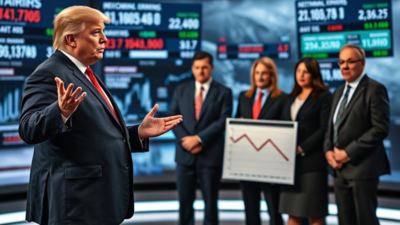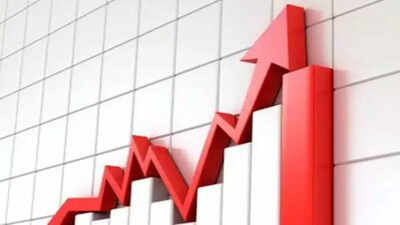Recession fears mount as US China tariffs fuel trade war havoc across global markets

Stock markets worldwide continued their decline on Friday after China retaliated against President Donald Trump’s latest round of tariffs, increasing concerns that the escalating trade war could push both the US and global economies into a recession.
The Dow Jones Industrial Average plummeted more than 1,600 points, or 4%, following a steep 1,679-point drop the previous day. The S&P 500 also slid by 5%, now down more than 15% from its recent peak. The Nasdaq Composite, home to many tech companies with significant business in China, fell by 4%, marking a near bear market as it hovered 21% below its December record close, according to AP.
The sell-off on Wall Street intensified Friday after Federal Reserve Chair Jerome Powell cautioned that the Trump administration’s tariffs are likely to drive up inflation and hamper economic growth.
On Friday, China’s Ministry of Commerce confirmed it would impose a 34% tariff on all US imports starting on April 10, directly matching the US move to raise tariffs on Chinese goods. This retaliation has exacerbated fears of a prolonged trade war between the world’s two largest economies, shaking confidence in global markets.
Tech stock hit hard for second day
The technology sector was hit especially hard, with Apple, Nvidia, and Tesla among the largest losers. Apple’s stock dropped over 4%, contributing to a 10% loss for the week. Nvidia saw a 7% pullback, while Tesla fell by 9%. These companies, which have substantial manufacturing and sales operations in China, are particularly vulnerable to Beijing’s retaliatory measures.
Recession fears
JPMorgan now estimates a 60% chance of a recession in 2025, up from 40% before the tariffs were imposed, as reported CNBC. Bruce Kasman, head of global economic research at JPMorgan, warned, “If sustained, these policies would likely push the US and possibly the global economy into recession this year.”
However, these projections are still evolving, with details about both the US tariff strategy and China’s response yet to fully emerge. Kasman’s note was published before China’s retaliation was officially announced. Despite a better-than-expected US jobs report, which showed accelerated hiring in March, markets remained on edge due to the long-term risks posed by the trade conflict.
“The world has changed, and the economic conditions have changed,” said Rick Rieder, Chief Investment Officer of Global Fixed Income at BlackRock.
Uncertainty looms
Many investors are now wondering whether this trade war will lead to a global recession. If that happens, stock prices could continue their downward trajectory. The S&P 500 has already lost about 16% from its all-time high in February, and many analysts predict more declines in the near future. Much of the uncertainty revolves around how long the tariffs will last and how other countries will react. Some Wall Street experts are hopeful that Trump might eventually negotiate down the tariffs after securing trade concessions from other nations, while others fear the trade war could drag on for months—or even years—with severe consequences for the global economy.
President Trump has acknowledged that US consumers might face “some pain” due to the tariffs but argued that the long-term benefits—such as bringing more manufacturing jobs back to the US—would justify the short-term costs. He likened the economic situation to a medical operation, suggesting that, while painful, the US economy, like a patient, would ultimately benefit from the procedure.
“For investors looking at their portfolios, it could have felt like an operation performed without anesthesia,” said Brian Jacobsen, Chief Economist at Annex Wealth Management.
The former CEO of Goldman Sachs, Lloyd Blankfein, proposed that President Trump allow countries to negotiate the tariffs in a more flexible manner as reported CNBC. Blankfein suggested keeping the 10% baseline tariff but delaying the implementation of the “reciprocal” tariffs for six months, giving countries the opportunity to negotiate and avoid further escalation.
Meanwhile, the global market turmoil deepened as European stocks also faced steep losses. Major European indexes dropped about 5%, reflecting investor fears over the impact of the trade war. Crude oil prices tumbled to their lowest level since 2021, and copper, an important indicator of global economic health, saw significant declines, signalling growing concerns about a worldwide economic slowdown.
The markets showed brief signs of recovery earlier in the day after the US reported stronger-than-expected job growth, with employers adding more jobs than anticipated in March. However, this positive data quickly lost steam as investors turned their focus back to the longer-term economic risks posed by the trade conflict.




